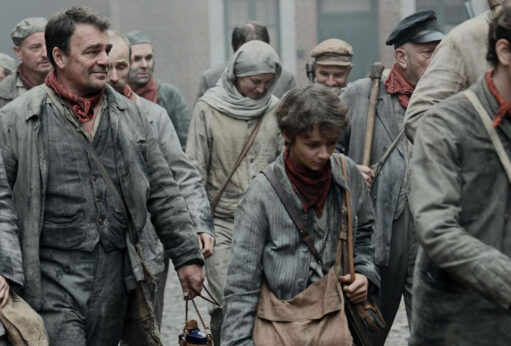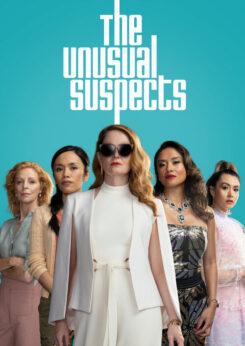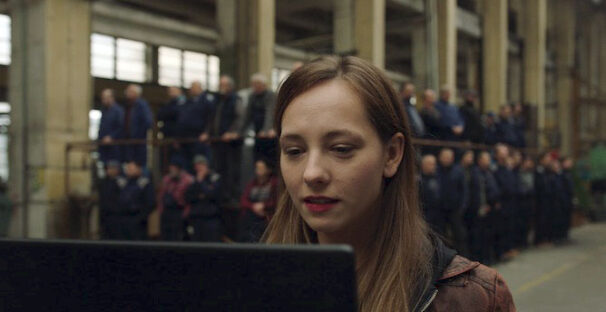
It’s Emmy Award season, but rather than dwell on television’s past it might be better to dwell on its future. What follows are the best (and worst) of fall series previewed at the recently concluded Series Mania, the Festival of Global Television in the French northwest former mining center of Lille where many of the series were concerned with either highlighting or concealing and smoothing over class differences in the wake of the vast transfer of wealth that has followed the COVID billionaire accumulation in the online gold rush.
The location was relevant because the best of these series was a new French public television version of Germinal. Two episodes of the six were broadcast at sites throughout this region which, when Zola wrote the novel in the 1880s about a worker action in 1860, was still the coal mining and industrial center of the world. The novel is a long debate about the need for, the effectiveness of, and the tactical ways of managing a strike as a way of workers clawing back some measure of decency from a life which requires ever more sacrifices just to make one’s daily bread. It’s the same struggle workers in sites like Amazon are engaged in today as they also face a triple onslaught from the government, as, with the Delta COVID strain rampant, Texas attacks mostly minority working-class women’s right to abortion and the Democrats allow the rent moratorium to end, throwing millions out into the street while withdrawing financial support in an attempt to force workers back to work in the same low-paying but now more dangerous jobs. To add insult to injury, all three attacks came over Labor Day Weekend.

Reimagining Germinal as Serial Television actually restores the novel to its original serialized version with its own hourly climaxes somewhat as Zola had written them for French magazines like Gil Blas. This is as opposed to tarnishing Zola’s image in a way that the supposedly magisterial but actually stuffily conservative 1993 film version by Claude Berri did in turning the living, breathing workers of Zola’s novel into stone-faced French national icons. There is a nice blend of personal and collective in the endings of the first two episodes which need to propel the audience forward. Episode one ends with what is depicted as the rape of the mining girl Catherine by a rough fellow miner Chaval, while episode two ends with Catherine’s mother Maheude, after her young son is crippled for life in a mining accident, casting a full-throated vote for a strike. There is a nod to contemporary financial structure as the mine manager Hennebeau positioned at a long table, on the other end of which sit the Parisian company stockholders, argues for the miners but is told by the board members that “this is a war” and they cannot relent.
The series is shot in cinemascope, but rather than giving the work a sense of grandeur, the effect, because of the grisly palette with the director citing as influences Peaky Blinders and the darkly ominous films of James Gray (Little Odessa, The Yards), is one of gloomy misery, visually echoing Zola’s description of the mine as “a mechanical monster and the men and women mere beasts or insects fed to the monster.” The series’ writer cites John Sayles’s Matewan as an influence, and the series premiered just days before the 100-year anniversary of what was called The Battle of Blair Mountain that the Sayles film is based on. Readers will recall that Matewan saw miners battle a company’s private army in an attempt to organize the Appalachian coalfields, not dissimilar to the strike described in Germinal or the Teamsters’ attempt to come to the aid of Amazon workers in their struggle to organize.
The producers turned down an invitation to premiere the series at the Venice Film Festival, preferring to present it as television and to premiere it in one of its iterations at what was the Arenberg pit in the town of Wallers, near where the novel’s action took place. The series is being used as a calling card for media production development in this area as a means of replacing the long-deserted mines. It is unfortunately also being trumpeted by the region’s director Xavier Bertrand as part of his calling card to represent the right-wing Republicans in the next presidential election on, ironically, an anti-working-class emphasis on the false issues of security and immigration, thus undoing Zola’s work in the novel.
On the plus side, the series also corrects an imbalance with the French series that are prized often being ineffective imitations of their American counterparts (10 Percent is warmed over, sentimentalized The Larry Sanders Show and Episodes—both bitter satires of the entertainment business, and Engrenage is only a step above Law and Order.) The best French series are those which deal in an authentic way with French history (Un village français about the German occupation and The Price of Peace about Switzerland coming to grips with its Nazi past after the war), or with contemporary social problems (the very excellent and only slightly veiled attack on carcinogenic polluters like Monsanto in Game of Influence about the high price European citizens pay for the corporate money invested in lobbying). In the aesthetic realm, there is almost a reversal of the situation in art in the first half of the last century, where everywhere there were copies of French art which generally stifled local artists, just as copying of American rom-com and crime formats today stifles more relevant French television and film production.
The companion piece to Germinal in terms of its high degree of class consciousness is the Australian series The Unusual Suspects about two high-end families and their Filipina maids in Sydney’s lavish, gated, eastern suburbs. This series follows in the wake of The White Lotus’s concentration on the gap between rich pampered tourists from the mainland and the still colonized Hawaiians who serve them at an elegant resort, (described in the New York Times by the way not as a series about gross inequality but as a part of a “resort cycle” of series about problems with vacationing). Both these shows, despite the New York Times description, make series that simply concentrate on the foibles of the rich such as Nine Perfect Strangers now seem antiquated.
Not creeping but creepy financialization
 The Unusual Suspects has the matrons of the two households, betrayed by either criminal or incompetent husbands, aligning with their maids to pull a heist to try to maintain their status. The show is a vicious satire about privilege with Sara, whose “brand” is #loveyournanny, ordering her maid Evie to sit at the breakfast table for a publicity photo as if they are one happy family and then, after the shoot, ordering her to get up and clean up.
The Unusual Suspects has the matrons of the two households, betrayed by either criminal or incompetent husbands, aligning with their maids to pull a heist to try to maintain their status. The show is a vicious satire about privilege with Sara, whose “brand” is #loveyournanny, ordering her maid Evie to sit at the breakfast table for a publicity photo as if they are one happy family and then, after the shoot, ordering her to get up and clean up.
The series has more on its mind, though than class satire. It is actually about the way that the dominance of financial capital and the symbolic economy is turning people into various kinds of scam artists, where nothing and no value is real. Sara’s (Miranda Otto from Lord of the Rings) “company” which she is trying to sell to an American investor is all about family management but she doesn’t know where her own kids are and that they have gone to the zoo. Roxanne, Filipina herself, who runs a high-end women’s health spa, described as a kind of scam where intuitive care is packaged as abundant scarcity, wrecks her maid Ana’s pension by allowing her husband to invest it in his Ponzi scheme, resulting in a bonding food fight, between the two since they are both now victims of the scheme. Gigi, a young Filipina, refuses to do the work of a maid and instead insinuates her way into Sydney society as a “coach” and self-help guru. The cross-class bonding between the matrons and their maids and the planned heist makes for an exciting series in the vein of the previous Aussie series Wanted about two women of different classes coming together. The real point of the series though, and its breakthrough is the way it highlights the sham element of advanced capitalist societies where value is divorced from production and created and lost on the whim of its “influencers,” hedge fund investors, and vulture capitalists.

The deterioration of Germinal’s factory economy is the starting point for Croatia’s The Last Socialist Artefact, about two “entrepreneurs” who must revive a turbine plant in rural Croatia, where the company has long since moved as a part of deindustrialization after the end of the Soviet era. The two work to reactivate the factory and restore the town, which is full of too-soon and too-long pensioned engineers, plant managers, and workers, now being given a second chance later in life. The series is a kind of Music Man for the deglobalized generation, a left-for-dead rural and Eastern Europe which saw its economy closed or plundered after the heavy infusion of capital post-1989. The question is whether the two idea men from the capital Zagreb will deliver on their promises. The “Trouble” in this “River City” is the global trouble of lives wasted because of lack of work with the series focusing on the hope of a revival as skilled workers from the town bring a new fellow feeling which outdistances and changes the “entrepreneurs,” humanizing them in giving them a stake in the wellbeing of the town that becomes more than just an investment as one takes up with a local bartender and the other falls for the comradery of the ex-factory workers.
The worst or most disappointing series tended to be those which simply focused on unbridled and unquestioned class privilege. The Bite, starring The Practice’s Audra McDonald, teases at being a zombie series but comes across simply as an Upper East Side COVID confinement show about a doctor and a dominatrix residing in the same luxury building as a zombie infestation sets in. CBS thinks it’s being very radical by proposing a Black female doctor and a blonde dominatrix as leads, but in fact, the series is a faux doctor and faux sex series with no intrusion into either life of any of the workers making their sheltered confinement possible. It’s even a faux zombie show with little tension or carnage or laughs and frankly, if you came for the zombies, as I did, you’ll be disappointed.
The sometimes reliable French actress Julie Delpy, star and then co-creator of Richard Linkletter’s Before Midnight film series, is one of the creators and the star of On The Verge, a series about four 40- and 50-something women in L.A. who help each other through the apparently difficult time of what in male series is called mid-life crisis. Unlike the far better Almodóvar film Women on the Verge of a Nervous Breakdown, where the heroines struggle against vicious patriarchy when these upper-middle-class career women are on the verge of not a nervous breakdown but rather a mild anxiety attack they go to the beach or more likely go shopping on Rodeo Drive. What they really are on the verge of is becoming “Karens,” the eponymous privileged racist figures that keep popping up in the media. Their supposed “struggle” for recognition as they age is in a way no more compelling than similar series about privileged men superseded by youth and now mostly relevant because of their wealth; let’s call them Dicks, a prominent example of which was TNT’s Men of a Certain Age.
The last and most interesting of this trio of series is Hacks, starring Jean Smart the Emmy-winning television stalwart, so convincing as the nearly inarticulate but steadfast working-class mother in Mare of Eastown, here reimagined as that character’s opposite. Smart plays Deborah Vance, a Las Vegas comic whose routines have long since ceased being funny and who lives in splendor so appalling and gross that when the young female, Hollywood writer she hires to revive her act approaches her mansion she mutters, “This is why we need a wealth tax.”
Hannah Einbinder’s Ava, as the wisecracking out-of-work writer, shows promise as an alternative voice in the series which unfortunately is never able to get beyond Smart’s unfunny, smarmy Vegas jokes which always seem to be outmoded. The two bond in their relation to comedy but that seems unlikely given the gap between Ava’s truth-telling humor and Vance’s truth-concealing Vegas put downs. It is interesting also that the show’s Hollywood creators position an up-and-coming Hollywood sit-com writer as an alternative to smarmy Vegas humor and lifestyle when in fact that writer is simply on the path to eventually becoming the same thing herself.
Far better at cross-class female bonding in the Wanted mode is Dough, a Swedish series about a down-and-out ex-convict mother trying to nurse her baby on the street and a middle-class, set-upon mother beset by financial difficulties and a troubling teenager who discovers a pile of loot, in a too pat coincidence belonging to the boyfriend of the ex-con, while she is in the forest meditating and taking a break from motherhood. Best scene is the ex-con mom, fleeing into the other mom’s restaurant to escape thugs trying to find her boyfriend’s loot, applying for a job, getting the job, and then telling the other woman she has a record but for nothing special, “petty theft, driving while drunk,” then walking away and turning as she remembers “and, oh yeah, assault.”
There is a dichotomy in the camera work around the two women with the poor woman getting the Dardenne Brothers up-close, in-tight Rosetta camera work, emphasizing her state of constant agitation, while the camera keeps a respectful distance from the middle-class woman who is actually just as harassed. At this point, the show begins to feel just a bit too complacent, though, as this post-Thelma and Louise bonding is now becoming not a way of emphasizing the shared plight of women but a de rigueur trope that fits too neatly into a pattern that elides class conflict. There is a wide gap between, as Judith Butler would describe it, the middle-class woman’s precariousness, a more universal plight about parenthood and raising a teen, and the working-class convict’s precarity, the result of a societal class war waged against her.
Last and least in this survey is The Rope, a series from the usually cinematically reliable French and European production house Wild Bunch. The series will keep you on the edge of your seat trying to answer not the question of where the rope that its multiple characters are following in this end-of-the-world ghostly setting leads, but rather the question “How on earth did this show get greenlit?” It’s Survivor meets Waiting for Godot, and not in a good way; a baldly philosophical series whose problem is the clumsiness of a conceit not grounded in any material reality. Here are some examples of the snappy dialogue: “Should we follow the rope?” “You need to keep following the rope.” “I don’t want to follow the rope.” And frankly, neither do we.
On the horizon in the new television season is hopefully more grappling with the wealth disparity which at its most absurd point features in the U.S. a recent report by the treasury that the rich have cheated the government out of 630 billion dollars in unpaid taxes while Congress argues over whether the poor and working people “deserve” to have daycare education and free community college. Let’s hope this season features more cross-class alliances, fewer Karens, and no more Dicks.
Breathless
To note in passing—no pun intended—Jean-Paul Belmondo died last week at 88. Belmondo was the New Wave icon, said to have brought in his insouciance and general amoral nonchalance a new kind of body to the French cinema, notably in Godard’s Breathless, Pierrot le fou, and Une femme est une femme. He was an active part of all of the contradictions of the day. Born of extremely privileged heritage in Neuilly, the richest city in France, he also was briefly a soldier taking part in the war in Algeria. However, he then was the lead in Pierrot le fou, pursued along with his female accomplice by OAS gangsters in a direct reference to the conservative forces that tried to oust De Gaulle because of his ending of the Algerian war. The film was censored for even these references with the censors paying particularly acute attention after Godard’s film two years earlier, Le petit soldat, in a way remade in the U.S. by Hal Ashby as The Last Recall, and both about a soldier’s reluctance to do their duty, in the French case to go to the Algerian war. Belmondo was also during this period the head of the French Actors Union, an affiliate of today’s still most radical union the CGT. He remained, after his New Wave stint, an emblem of the French popular cinema.

MOST POPULAR TODAY

Zionist organizations leading campaign to stop ceasefire resolutions in D.C. area


High Court essentially bans demonstrations, freedom of assembly in Deep South

Afghanistan’s socialist years: The promising future killed off by U.S. imperialism

Communist Karol Cariola elected president of Chile’s legislature



Comments